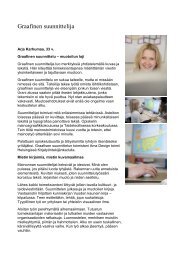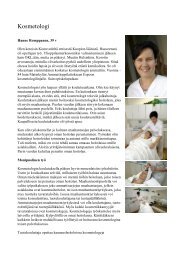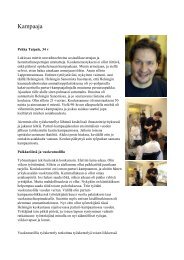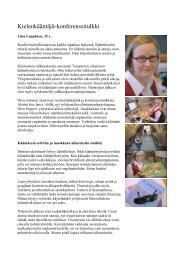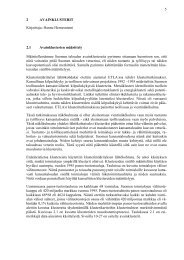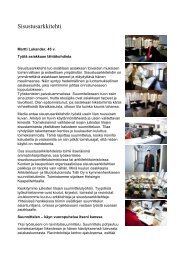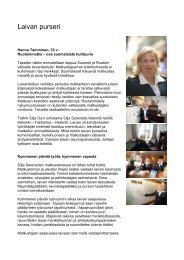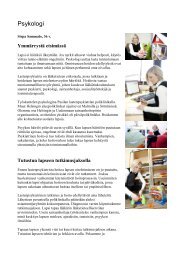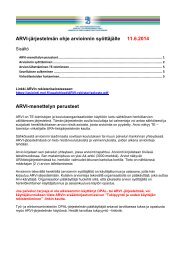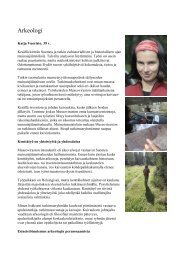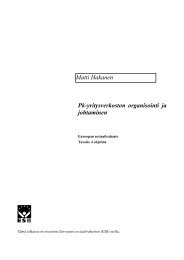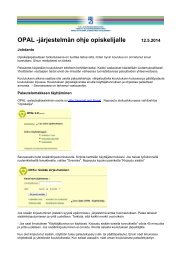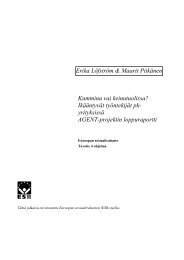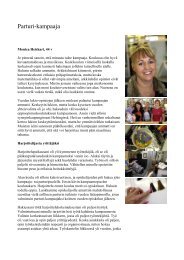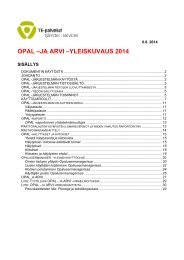Working Life Barometer in the Baltic Countries 2002 (pdf) - mol.fi
Working Life Barometer in the Baltic Countries 2002 (pdf) - mol.fi
Working Life Barometer in the Baltic Countries 2002 (pdf) - mol.fi
Create successful ePaper yourself
Turn your PDF publications into a flip-book with our unique Google optimized e-Paper software.
261<br />
Entrepreneurs <strong>in</strong> <strong>the</strong> <strong>Baltic</strong> countries have not, generally speak<strong>in</strong>g, been overly<br />
eager to <strong>in</strong>vest <strong>in</strong> develop<strong>in</strong>g <strong>the</strong> know-how of <strong>the</strong>ir personnel. On <strong>the</strong> whole,<br />
<strong>in</strong> all <strong>the</strong> <strong>Baltic</strong> nations, work-related tra<strong>in</strong><strong>in</strong>g concerns quite a small proportion<br />
of <strong>the</strong> wage earners. In Latvia dur<strong>in</strong>g <strong>the</strong> past year, one-quarter of all<br />
work<strong>in</strong>g women and one-<strong>fi</strong>fth of <strong>the</strong> men had attended tra<strong>in</strong><strong>in</strong>g or courses ei<strong>the</strong>r<br />
partly or completely paid for by <strong>the</strong> employer. Of <strong>the</strong> private-sector wage<br />
earners, only 15 % had attended tra<strong>in</strong><strong>in</strong>g. The average duration of such tra<strong>in</strong><strong>in</strong>g<br />
is typically 6-7 days.<br />
In general, Latvian workers see <strong>the</strong>ir possibilities for <strong>in</strong>fluenc<strong>in</strong>g <strong>the</strong>ir work<br />
tasks as ra<strong>the</strong>r good. Half of all <strong>the</strong> work<strong>in</strong>g people felt that such possibilities<br />
for <strong>the</strong>m were ei<strong>the</strong>r extremely good or ra<strong>the</strong>r good. Fur<strong>the</strong>rmore, <strong>in</strong> this aspect,<br />
work<strong>in</strong>g life is quite democratic, as no differences of any k<strong>in</strong>d were noticeable<br />
between public- and private-sector wage earners, or men and women,<br />
or workers of different ages. As regards possibilities of <strong>in</strong>fluenc<strong>in</strong>g one's job<br />
tasks, <strong>the</strong>refore, Latvian work<strong>in</strong>g life is <strong>in</strong> good shape and <strong>the</strong> situation has<br />
developed <strong>in</strong> a positive direction.<br />
Job satisfaction has dropped a little s<strong>in</strong>ce <strong>the</strong> last study. A majority still consider<br />
<strong>the</strong> workplace atmosphere and solidarity between colleagues to be good,<br />
but <strong>the</strong> percentages are no longer as favourable as before. This is l<strong>in</strong>ked to <strong>the</strong><br />
fact that all types of disagreements and conflicts at <strong>the</strong> workplaces have become<br />
more widespread and <strong>the</strong>ir frequency has <strong>in</strong>creased <strong>in</strong> <strong>the</strong> last few years.<br />
One-quarter of <strong>the</strong> work<strong>in</strong>g people said that <strong>the</strong>re were ei<strong>the</strong>r a lot or quite a<br />
lot of conflicts at <strong>the</strong>ir workplace between superiors and those under <strong>the</strong>m.<br />
Competition between employees has also <strong>in</strong>tensi<strong>fi</strong>ed, and this has led to a<br />
def<strong>in</strong>ite <strong>in</strong>crease <strong>in</strong> disagreements between <strong>the</strong>m. The more frequent disagreements<br />
and somewhat dim<strong>in</strong>ished job satisfaction have not, however,<br />
meant that go<strong>in</strong>g to work has lost any of its mean<strong>in</strong>gfulness. Over half of <strong>the</strong><br />
work<strong>in</strong>g people feel that hav<strong>in</strong>g a job is becom<strong>in</strong>g more mean<strong>in</strong>gful than before.<br />
The Latvian nationals are clearly more positive <strong>in</strong> <strong>the</strong>ir evaluations than<br />
are <strong>the</strong> Russians.<br />
LITHUANIA<br />
<strong>Work<strong>in</strong>g</strong> life <strong>in</strong> Lithuania is problematic <strong>in</strong> many respects. In <strong>the</strong> previous<br />
<strong>Work<strong>in</strong>g</strong> <strong>Life</strong> <strong>Barometer</strong> for <strong>the</strong> <strong>Baltic</strong> countries, we predicted that <strong>the</strong>re were



